When will they pay? Floridians say state not holding insurance carriers accountable post-Ian
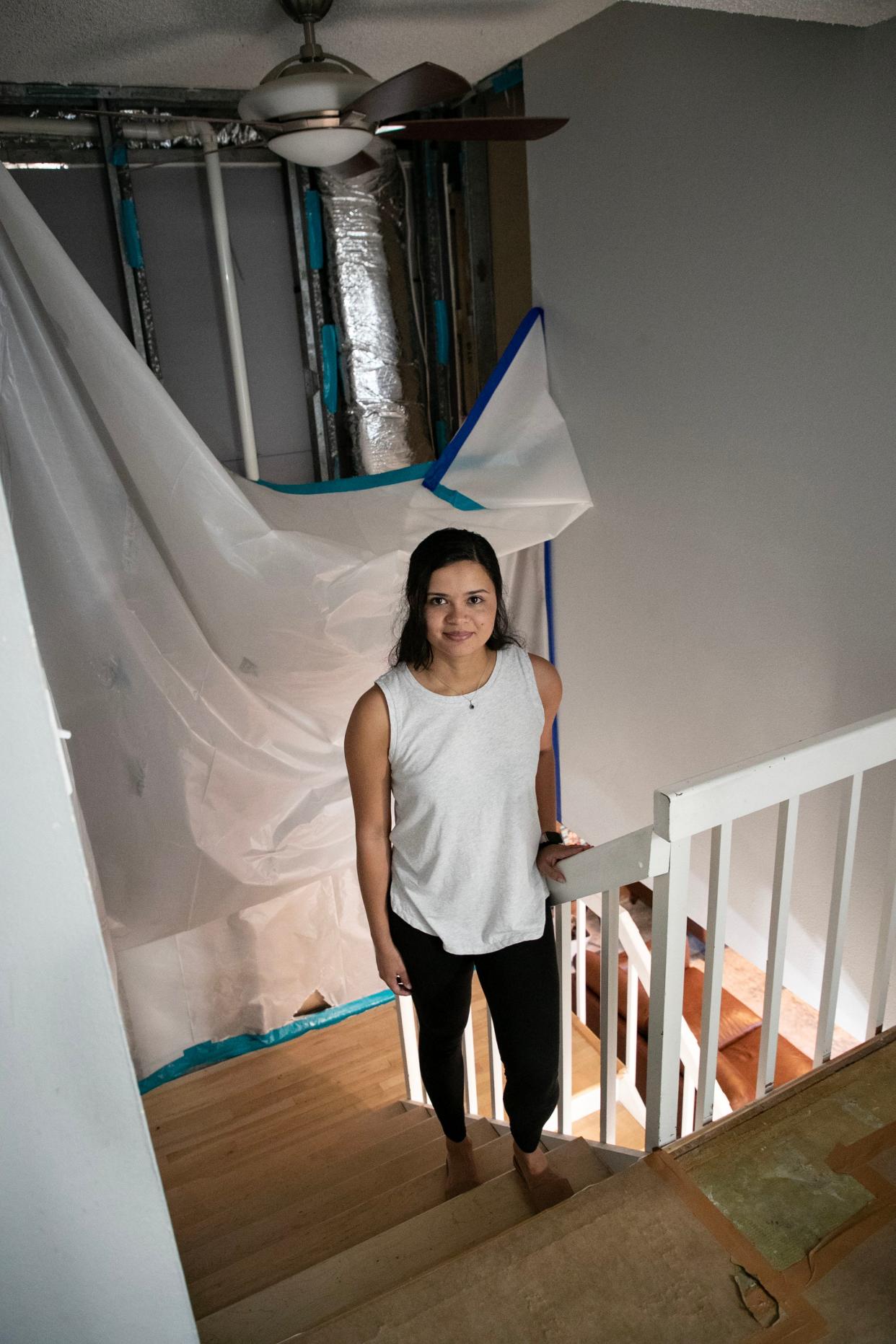
It started in the master bedroom.
The night Hurricane Ian threw itself against the edges of Southwest Florida, battering homes and sheeting down rain, its 145-mile-per-hour winds lifted the roof from the home where Sara Alvarez and her husband, Justin Jackson, sheltered.
Rain poured in, soaking belongings, walls and floors. As the winds battered the townhouse for hours, it leaked in wherever roof met wall. By the time the storm had passed, the ground floor was covered in 2 inches of water despite Jackson's attempts to suck it from the ceiling with a Shop-Vac.
Mold soon grew in the paths water had carved in the walls. It plagued Alvarez, who works from home, with daylong headaches and flu-like symptoms.
But that was just the start.
After a contractor tore out the couple's moldy walls, the insurance company for the homeowner's association at Phase VI of Parkwoods in south Fort Myers refused to pay the $2 million in emergency repairs for their and 67 other townhouses in the community. It left dozens of families living in half-gutted homes.
But Heritage Casualty & Property Insurance is far from the only insurance company leaving Floridians in the lurch, state records show.
Although Florida’s next hurricane season is well underway, many Floridians still haven’t recovered from the last one. They complain their carriers delay claim payments, lowball their customers or deny pay entirely. Consumers and their advocates say the state isn’t doing enough to help them –– that it’s soft on insurers and it’s soft on insurer crime.
More than 4,000 residential owners filed complaints with the state against their carriers after Hurricane Ian.
In just 17 complaints by residential property owners since January did consumers see their coverage extended, an additional payment issued or their claim reopened. With insurers leaving the state, premiums rising and homes still in disrepair, many are turning to consumer attorneys for help.
“This is a prevalent and common problem that we're seeing every day,” said Fort Myers consumer lawyer Michael McQuagge. Since Ian, “everybody’s got a problem where they’re either getting not enough, or they’re just not going to cover it.”
He hasn’t seen just one bad apple –– it’s happening with every insurer out there, he said.
Days after Ian left Lee County, tracking northeast, Panama City-based contractor SouthernCAT came and tore down drywall throughout the Parkwood townhomes. Its workers hung huge fans to dry the mold, and welded gray tarps onto the roof. They warned the residents the tarps should only be used for a few months, and then left, planning to return in the coming months to rebuild the walls and roofs.
But Heritage refused to pay out for SouthernCAT’s work on the community until the following July, after The News-Press / Naples Daily News questioned the carrier, despite being far past the 90-day period Florida law says insurers have to pay legitimate claims.
After months of nonpayment, SouthernCAT ceased its work on those townhomes and placed liens on them totaling roughly $30,000 per unit, Lee County records show. SouthernCAT did not return multiple requests for comment.
Meanwhile, Heritage also low-balled Parkwoods on the cost to restore the damaged townhomes to their original conditions. It promised to pay only $1.4 million out of two claims totaling $12 million – and that offer only came after the homeowner’s association filed a complaint with the state.
When contacted by a reporter, Heritage’s Vice President of Claims Joe Powers said he didn’t know about the Parkwoods situation but that it was now his “biggest concern” and that Heritage would be sure to pay out the emergency claim. He also promised the company would revisit the $10 million claim.
That’s small comfort to the thousands of homeowners across Florida whose own insurers are still dragging their feet.
Racking up complaints
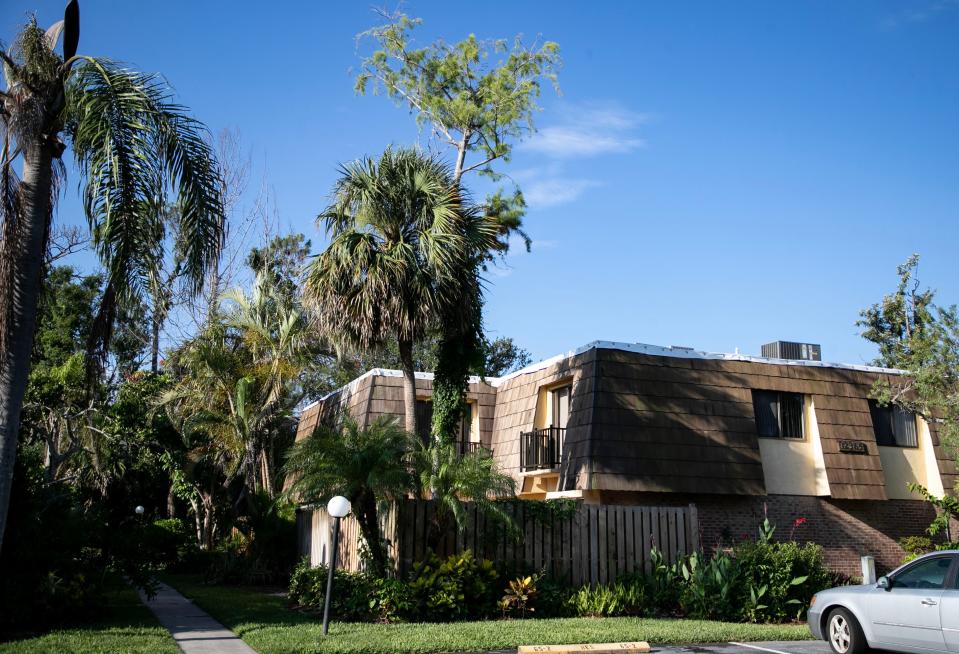
In the past several years, Florida’s property insurance landscape has slowly begun strangling its customers. Premiums are rising, insurers are going under or have stopped writing policies in the state, and wetter, more intense climate change-fueled storms are doing more damage. To top it off, inflation means it’s more expensive to rebuild after damage. A lowball offer or a denial of claim entirely can decimate a homeowner.
Consumers have little recourse against their carriers, other than opening a lawsuit or complaining to the state. And recent years have seen new barriers to filing a lawsuit erected – and opening a complaint doesn’t guarantee success.
The News-Press / Naples Daily News reviewed records of complaints consumers filed against their property insurance carriers since January. The record bore out McQuagge’s assertion.
While Florida Chief Financial Officer Jimmy Patronis’ office received more than 12,000 complaints against carriers since January, 4,173 cited Hurricane Ian as the source of damage to residential property. A little under two-thirds –– or 2,525 –– of these complaints cite delay of claim, underpayment or an unresponsive carrier.
Read more: Which insurance carriers are Florida homeowners complaining about?
'Everyone's so overwhelmed': Hurricane Ian survivors battle heat, FEMA, red tape, grief
Lee, Collier and Charlotte counties were the hardest-hit by the hurricane, and the data shows that when it comes to claim payments they, too, are the hardest-hit, registering 60% of complaints for too-low or too-slow payouts.
Although state-owned Citizens Property Insurance Corporation was the subject of the largest number of complaints, American Integrity Insurance Company of Florida collected the most complaints of claim delay and American Traditions Insurance Company racked up the highest number of complaints of underpayment, records show.
Some carriers may see higher numbers of complaints filed against them as they have more policies in the areas impacted by Ian, said Patronis' communications director Devin Galetta.
Heritage, the carrier that insures Parkwoods VI, racked up 683 complaints since October 2022. More than a third of those allege a delay of claim payment related to Hurricane Ian.
The Office of Insurance Regulation, which carries out market investigations of insurer fraud, declined a request for an interview. Spokesperson Samantha Becquer said by email that it had investigated at least 50 cases of potential insurer fraud, but declined to answer if any insurers had been found guilty of fraud, if any of the insurers were penalized or referred for criminal charges, or even what penalties the insurers could face.
Patronis told The News-Press / Naples Daily News that the most common complaint his office saw from policyholders against carriers was delay of claim payment, but he chalked that up to a combination of fear, ignorance and impatience.
“People, they're dealing with a disaster,” Patronis said. “Their life investment has just been destroyed. And so, you know, it never moves fast enough.”
Patronis urged disgruntled policyholders to file a complaint with his office, which can investigate specific claims.
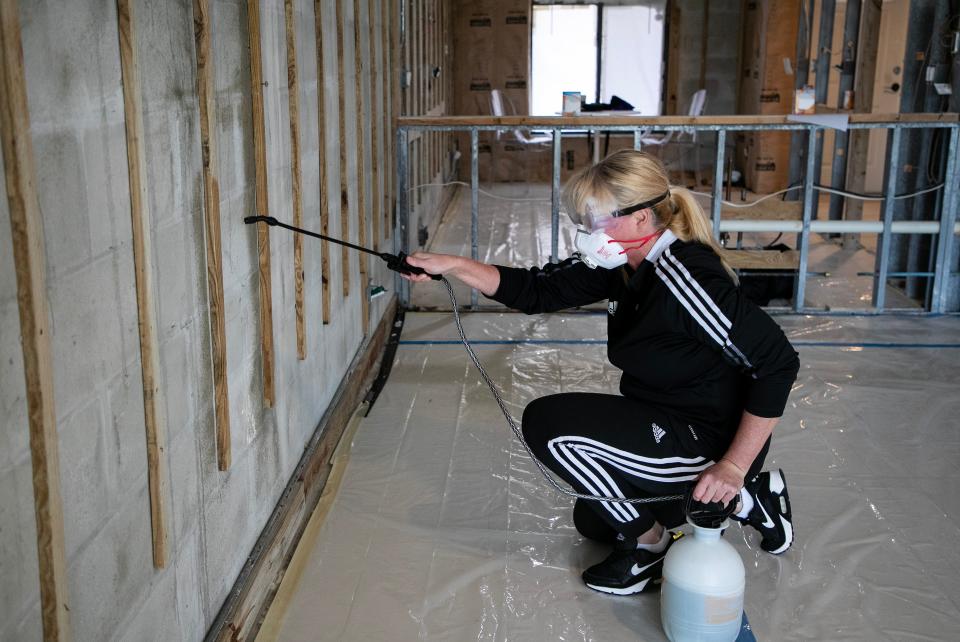
“We're the absolute best tool in the road to recovery,” Patronis said.
But the News-Press / Naples Daily News heard from a variety of homeowners who, like the Parkwoods Phase VI HOA, had or contemplated filing complaints with the state –– and some who did found that it didn’t help as much as they’d hoped.
Kostas Lazarides, whose condo on Sanibel Island was literally lifted off its pilings by the storm surge, hasn’t heard from his agency since October 2022 despite filing a complaint with the state.
Kelly Seanor, whose roof and kitchen of her Fort Myers home were demolished by the storm, initially filed a complaint but found she was required to drop it in order to pursue a lawsuit against her insurance carrier.
And Cher Luisi, who had just finished renovating her condo when Hurricane Ian flooded it, skipped the complaint entirely and went straight to a “shark” lawyer based in Miami –– she’s filed complaints with the state before and they were “slow as molasses.” She didn’t think it would be as quick or effective as suing, she said.
Still, Patronis expressed satisfaction with the disaster-specific fines for carriers defrauding customers – up to 500% above normal. No companies have faced these fines levied by the Office of Insurance Regulation yet, he said, but added that the state was investigating allegations of fraud raised by The Washington Post’s investigation into Heritage’s potential rewriting of assessors’ reports.
According to Heritage’s 2022 fourth-quarter earnings report, while millions of dollars in Ian claims were rolling in from its Florida policyholders, Heritage reported a net income of $12.5 million, up from a loss of $49.2 million one year earlier.
For every dollar it took in in the fourth quarter, it paid out 62.4 cents to claimants and an additional 33.7 cents in expenses, drawing a profit of four cents on every dollar.
Florida’s insurance crisis
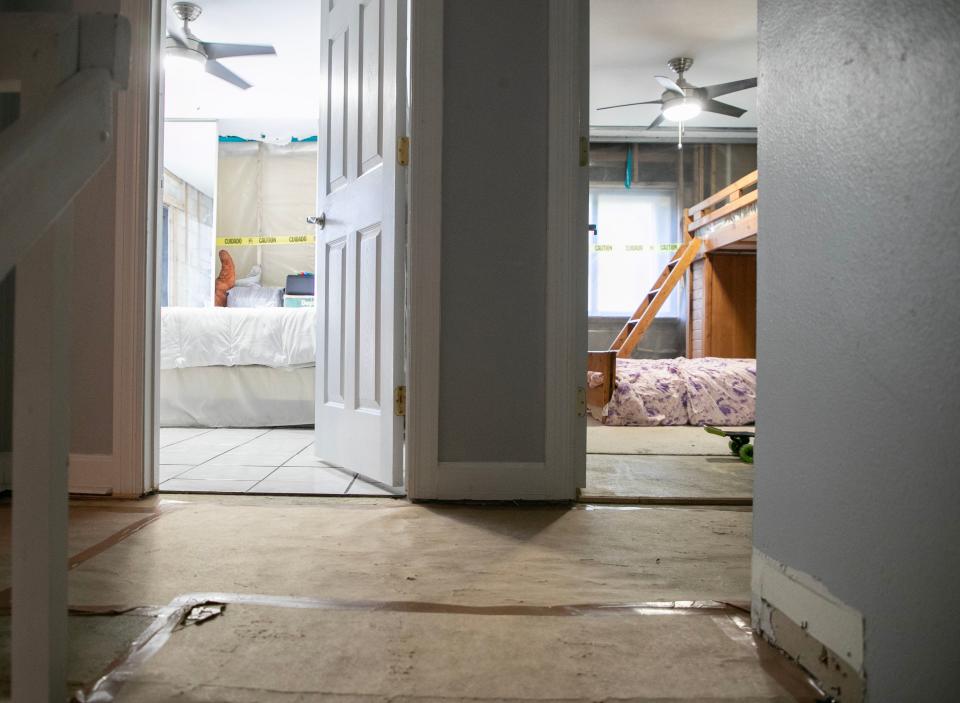
Florida has some of the nation's highest property insurance rates with annual premiums averaging $6,000 – a 42% hike from last year and three times the U.S. average, according to nonprofit Insurance Information Institute, which works to demystify the industry.
Spokesman Mark Friedlander said the higher prices reflect the rising cost of doing business in the state for insurance companies who cite civil lawsuits and exorbitant claims from non-stop natural disasters fueled by climate change.
Those have driven insurers into insolvency and prompted more to stop writing new policies in the state, Friendlander said.
But insurance industry watchdog and nonprofit American Policyholders Association executive director Doug Quinn said he believed the industry’s complaint of lawsuits was overhyped –– that the problem at the root of Florida’s insurance woes was company mismanagement and premium harvesting. The 2022 report from the Florida Division of Rehabilitation and Liquidation on insurers that went belly-up indicated they suffered from poor management, insufficient claim reserves, asset deterioration and natural disasters, among other factors.
By over-harvesting premiums, smaller companies leave too-little cash in reserve to deal with the surge in claims they experience during hurricane season and fold, Quinn said.
There is no disputing that Ian caused hundreds of billions in damage, making Florida an unappealing market to carriers. Over the last quarter-century, Florida’s yearly hurricane damage cost varied between $3.7 billion and $49 billion.
The National Hurricane Center’s April report on Hurricane Ian found it caused $109 billion in damage in Florida alone. As of June 16, just $16 billion of Ian-related losses were insured, Florida Office of Insurance Regulation data shows.
As insurers have closed down lines or raised premiums, the number of policies for state-owned "insurer of last resort" — Citizens Property Insurance — has nearly tripled in four years. It swelled from about 419,000 state-backed insurance policies in April 2019 to 1.2 million in April 2023.
More than 521,000 Ian-related residential property claims have been filed; about 82,000 remain open.
After the hurricane subsided, the Parkwoods homeowner’s association contracted with repair company SouthernCAT to remediate mold and fix the homes Ian had inundated, according to their meeting minutes. It came recommended by Acentria Insurance Agency, which sold the community its insurance policy with Heritage.
The News-Press / Naples Daily News reviewed meeting minutes, board association emails, insurance paperwork and more documentation obtained from a Phase VI condo association member to ascertain and verify what happened.
A copy of the policy summary that covered the community from May 2022 to May 2023 shows each of the townhomes were valued at $605,287 – and that Heritage was on the hook for up to 100% of the cost of the structure to repair it.
But Heritage ignored the initial claim for emergency mold remediation and lowballed the larger claim for repairs until contacted by the state.
Powers told the The News-Press / Naples Daily News in July he did not understand why his company had not yet acknowledged or paid out the emergency work claim, nor why it had lowballed the second repair claim.
“I can't really speak to why we're in July, and that wasn't addressed,” Powers said. But, he said, he planned to cut the community a check by the end of the following day, which would allow SouthernCAT to remove the liens.
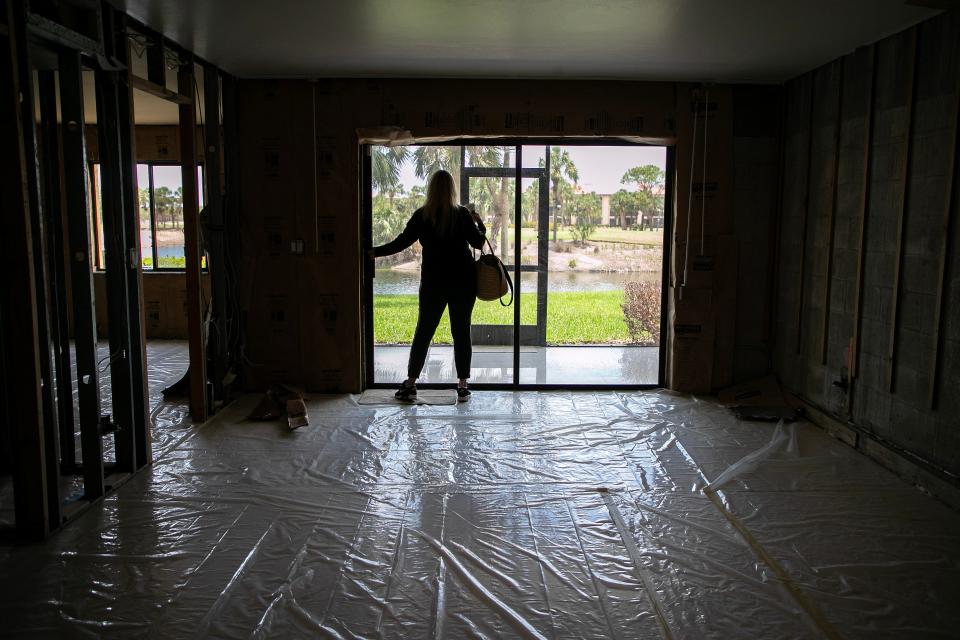
Legally, carriers can wait more than 90 days to pay a claim if they find it suspicious to the point of investigation, the law says. However, neither Alvarez nor Powers were aware of Heritage conducting any investigation into the emergency mold remediation claim.
“Are we perfect? Absolutely not,” Powers said. “But it is at the core of my belief that insurance companies want to do the right thing.”
The board warned residents in their January meeting minutes that if Heritage didn’t cancel their policy, insurance costs were sure to go up, since the community was now rated as a flood zone.
Soft on insurance carriers?
By mid-August, Alvarez told The News-Press / Naples Daily News that Heritage had paid out the claim to Parkwoods VI, adding that Lindquist told her the reporting helped get that settled. Still, the liens have yet to be lifted, and everything remains as it was: a monument to Hurricane Ian's destruction.
Heritage has yet to face consequences –– other than bad press.
Consumer advocates like Quinn say Florida is soft on insurance carriers, allowing them to get away with delay of payment claim or nonpayment.
Quinn called on Patronis and DeSantis to push for stiffer penalties for insurance fraud perpetuated by carriers, including levying criminal charges against carrier executives found to be stealing from consumers by paying inappropriately low returns on claims – or by not paying them at all.
“There is a lack of enforcement against the insurance industry,” Quinn said. “You can't take a company that stole a million dollars and fine them $25,000 and say that is a deterrent to bad behavior.”
Patronis said that while his office and the Office of Insurance Regulation can turn over evidence of wrongdoing for criminal prosecution to the state, the final decision on whether or not criminal charges are filed is made by state’s attorneys.
“But if they've done wrong, we'll make sure that they're punished to the point where they don't want to do business in Florida anymore,” Patronis said.
His office provided records that showed American Integrity Insurance, Citizens Insurance, People’s Trust and First Protective Insurance along with Heritage were among the top offenders when it came to Ian-related customer complaints.
So far, none have faced prosecution or fines through Patronis’s office. It is difficult to know if any are under investigation as the Office of Insurance Regulation, which conducts investigations of carriers, declined to say.
Patronis received about $2 million in donations for his campaigns from insurance carriers and their executives to his PAC. Heritage itself donated at least $100,000 to his campaign. Over the past decade the insurance industry has donated roughly $74 million to Florida politicians and the Florida Republican Party, the party currently leading the state. It is unclear how much carriers have donated to Democrats in the same time.
These types of donations are not uncommon nor extraordinarily high, said Ben Wilcox, research director with Integrity Florida, a Tallahassee-based nonprofit that has studied the connection between campaign fundraising and policy. Still, Wilcox called these donations “legal bribery."
“They’re not making those campaign contributions out of their interest in good government; they’re hoping the government is going to be good to them when it comes to regulation,” Wilcox said.
According to homeowner’s association meeting notes, after Heritage spent months refusing to pay the claim out and only sporadically responded to her request for updates, president Lori Lindquist filed a complaint against the company with the state Chief Financial Officer in April. Soon, the state opened an investigation into Heritage.
After she filed the complaint, Heritage finally responded, Lindquist told members. She declined to speak on the record about the claims and complaint but the May 2023 homeowner’s association meeting notes plainly spell out the community’s frustration with Heritage’s delays and silence.
“We would like to avoid litigation but if we have to then we will in order to get the claim paid,” the board wrote.
McQuagge said for smaller claims than Parkwoods’, litigation is a tough hill to climb. He blamed SB-2A, which Governor Ron DeSantis signed on Dec. 16, 2022, with stripping policyholders of the right to sue by coming after Florida Statute 627.428, the “David and Goliath” statute. The statute required carriers pay customer attorney fees when they sued, making it easier for low-income policyholders or people with small claims to go to court.
“It’s really limited what policyholders can do, whether you’re a condo or an HOA,” McQuagge said. “You’ve been stripped of power to go after an insurance company.”
According to its proponents, SB-2A was meant to lower premiums by limiting lawsuits against the companies.
But “what the new senate bill has done is denied these consumers access to court,” McQuagge said.
And though Patronis cited the July 2023 law SB-7052 as a consumer protection bill that would keep insurance companies in line, McQuagge said it was toothless –– it largely requires insurers to do what they’re already doing.
“Although this looks like consumers got protection, I don't really know if they did,” McQuagge said. “My opinion: obviously, they saw the hurricane claims coming.”
They fear every storm
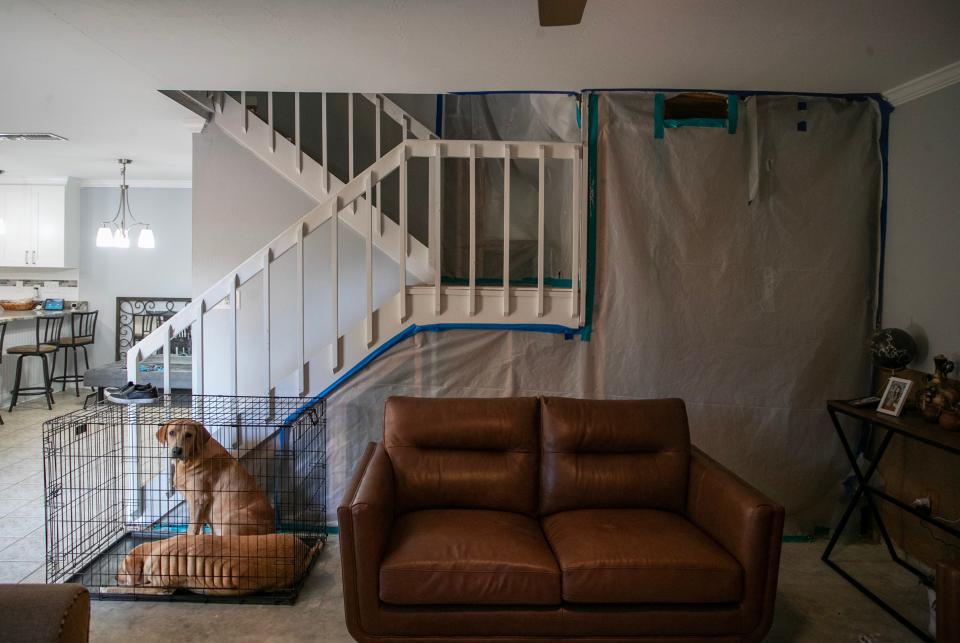
Meanwhile, Heritage and other companies have successfully delayed or denied claims for eleven months.
Since October, Alvarez and Jackson have been living in a construction zone. Gone is drywall; the walls of their home feature transparent plastic sheeting fastened to studs. Yellow caution tape stretches across Jackson’s daughters’ bedroom walls. Wires and overhead lights hang exposed, with ceilings ripped down. They pried the flooring up themselves to get rid of even more mold.
They hope to build a home in Punta Gorda, but worried they wouldn’t be able to sell their townhome. Who would buy it in the condition it’s in?
In June, standing around the kitchen island from in their half-finished home, Alvarez and Jackson felt trapped and uncertain.
“Heritage is a joke,” Jackson said.
Alvarez nodded in response. “I mean, to not even do an inspection for five months?”
“We’ve done all we can,” Jackson continued, ticking items off on his fingers. “We’ve scraped the concrete, we went to Aldi’s to buy cheap carpets to put up there and everything.”
“To make it livable,” Alvarez replied, finishing his thought.
And when the next hurricane comes? They can only hope their tarped roof will make it through. It likely won’t be fixed in time.
“Whenever it rains, it’s like PTSD,” Jackson said. He turned his hands up, helpless.
Correction: This story has been updated to correct the title of American Policyholder Association Executive Director Doug Quinn.
This article originally appeared on Fort Myers News-Press: After Ian: Is Florida holding property insurance carriers accountable?

